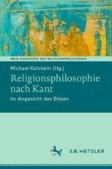Search
Search Results
-
Radikalität oder Banalität des Bösen? Überlegungen zu Kant und Arendt
Das radikal Böse ist ein von Immanuel Kant 1792 zuerst verwendeter Begriff. Er bezeichnet in Kants Autonomie-Ethik, die sich nicht mehr an religiösen...
-
On the Autonomy of the Transcendental Time-Horizon: an Essay in De-Subjectivizing Heidegger’s Kant-Interpretation
In this paper, I discuss, in a Heideggerian context, the possibility of de-subjectivizing the notion of the transcendental time-horizon and...

-
The Relation between Reality and Negation in Kant, Maimon, and Fichte
The aim of this paper is to show that the binary notions of reality and negation play an important role in the philosophical agenda of Kant, Maimon...
-
Freiheit und Böses nach Kant. Ein Problem und seine Lösung
„Maximen kann man nicht beobachten, nicht allemal in sich selbst“, sagt Kant zu Beginn der Religionsschrift, also muss man auf sie schließen aus...
-
Karl Leonhard Reinhold’s Influence on Schiller’s Reception of Kant
Bondeli shows that Schiller’s reading of Kant’s critical philosophy was since 1787 guided by Reinhold and that Schiller’s own philosophical-aesthetic...
-
Immanuel Kant über den Hang zum Bösen und seine Überwindung
Immanuel Kants Theorie des radikal Bösen im Menschen, die er in seiner Schrift Die Religion innerhalb der Grenzen der bloßen Vernunft von 1793...
-
Immanuel Kant
Die im engeren Sinne politische Bedeutung des Wortes „liberal“ und erst recht der Begriff des Liberalismus haben im deutschsprachigen Raum...
-
Between Reimarus and Kant: Blumenbach’s Concept of Trieb
The notion of Trieb, constitutive for Blumenbach’s greatest conceptual intervention, the Bildungstrieb, intentionally separated it from the other...
-
Die Kritik des Vernunftglaubens. Kant und Habermas über die Moral der Moral
Blickt man rückschauend auf die beiden Alterswerke von Kant und Habermas[aut]Habermas, Jürgen, so sind verwandtschaftliche Motivlagen durchaus...
-
Skepticism and Beyond: Skeptics and Kant on Critique and Ideals
Using the philosophies of Hellenistic Skepticism and Immanuel Kant, this chapter shows the evolution from a purely skeptical perspective to pragmatic...
-
Critique, Finitude and the Importance of Susceptibility: A Rossian Approach to Interpreting Kant on Pleasure
In this paper, I take Philip Rossi’s robust interpretation of critique as an interpretive guide for thinking generally about how to interpret Kant’s...
-
Kant/Neukantianismus
Die Philosophie Immanuel Kants und – wenn auch in weit geringerem Maße – der Neukantianismus waren für das philosophische Denken von Hans Jonas...
-
Du Châtelet and Kant: Claiming the Renewal of Philosophy
In 1789, Eberhard repudiated Kant’s claim expressed in the first edition of his Critique of Pure Reason to have delivered a new, namely...
-
Armut bei Kant
Nach Kant ist die Armut ein unerwünschtes Phänomen, dessen Entstehung hauptsächlich den durch menschliche Interaktionen entstandenen...
-
Immanuel Kant
According to Kant, respect is the mode of recognition of others as rational agents, capable of setting their ends and holding moral status. Respect...
-
Divine Gütigkeit, Divine Güte: Kant on an Ancient Query
In his essay on theodicy, Kant explicitly claims that while the disproportion between crime and punishment poses a theodicean challenge concerning...
-
On Kant and Husserl on transcendental logic
It is well known that the notion of transcendental logic has a prominent role in both Kant’s and Husserl’s theories of knowledge. The main aim of the...
-
Kant on Remote Working: a Moral Defence
In this article I maintain that when employers could free workers from the space constraint of the office without incurring unbearable economic...
